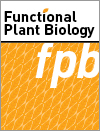Rosa damascena Mill. was treated with two elicitors (magnesium oxide nanoparticles and methyl jasmonate) at several concentrations, alone or in combination, via foliar spray. Effects of the treatments on the concentrations of phenolic compounds, flavonoids and anthocyanins, antioxidant Cactivity and changes in volatile organic compound concentrations at flowering stages were investigated. Our result demonstrated that the elicitors stimulated production of monoterpenoid and aromatic alcohols that are responsible for the perfume of petals. The elicitors also enhanced concentrations of total phenolic compounds and flavonoids in flowers.

Functional Plant Biology
Volume 52 Number 10 2025
A pan-genome-wide analysis of the terpene synthase (TPS) gene family in yellowhorn (Xanthoceras sorbifolium) identified 257 TPS genes across five varieties. Phylogenetic analysis categorised these genes into distinct functional clades, while conserved domain and motif analyses highlighted their structural features. Expression profiling under cold and drought stresses, and tissue-specific expression studies revealed key roles of TPS genes in stress tolerance and physiological processes. The findings provide insights into the TPS gene family, offering potential applications in crop improvement and biotechnology.
This article belongs to the collection: Functional Genomics for Developing Climate Resilient Crops - Volume II.
Viral diseases pose a serious threat to global agriculture, causing important crop losses. We investigate how plants, viruses and natural resistance mechanisms interact, focusing on the role of the WRKY gene family in regulating plant defenses. Understanding how WRKY transcription factors help plants resist to viral infections that could lead to improve strategies for crop protection and enhancing food security worldwide.
This is the first study to comprehensively examine drought stress effects on physiological performance and bioactive compounds in Andrographis paniculata across three growth stages. Drought stress increased bioactive compounds during vegetative and flowering stages, but had no effect at the fruiting stage. The flowering and fruiting stages are more sensitive to drought stress than the vegetative stage. Findings may help determine optimal harvesting times, improve irrigation practices, and develope drought-tolerant genotypes to enhance bioactive compound content and reduce yield loss.
An integrative analysis of chickpea cultivars under Fusarium wilt stress demonstrated cultivars’ specific agronomic, physiological, and gene expression responses. Increased antioxidant enzyme activity and upregulation of defense-related genes, such as WRKY55 and MADS-box TF23-like, were correlated with resistance. These results are worth using in breeding Fusarium-resistant chickpea cultivars.
This article belongs to the collection: Soil Microbiome and Abiotic Stress Tolerance in Plants.
FP25100 Abstract | FP25100 Full Text | FP25100PDF (3.5 MB) | FP25100Supplementary Material (174 KB) Open Access Article
We explore how copper treatment influences the redox state and secondary metabolism in Scutellaria baicalensis Georgi roots. Copper exposure elevated the glutathioine (GSH): oxidized glutathione ratio, and altered the expression of genes related to GSH recycling and the salicylic acid pathway. Distinct accumulation patterns of baicalin and baicalein suggest a redox-mediated adjustment of secondary metabolism in response to copper treatment.
Green-synthesized ZnO and MgO nanoparticles, produced using neem and licorice extracts, improved maize tolerance to alkaline stress. Moderate doses enhanced growth, photosynthetic pigments, antioxidant enzymes, and osmolytes and reduced oxidative damage (MDA, H2O2, RMP). Excessive nanoparticle concentrations were phytotoxic. Findings suggest nanoparticle-based strategies can enhance crop resilience and promote sustainable agriculture in alkaline soils.
This article belongs to the collection: Soil Microbiome and Abiotic Stress Tolerance in Plants.
FP25200 Abstract | FP25200 Full Text | FP25200PDF (5.2 MB) | FP25200Supplementary Material (2.2 MB) Open Access Article
Our results showed that chilling stress reduced Capsicum annuum L. seed germination and seedling emergence. 3-OHM application significantly enhanced germination and emergence performance under stress conditions. 3-OHM application mitigated oxidative damage by boosting proline content and amplifying the activities of antioxidant enzymes. 3-OHM was shown to behave in a melatonin-like manner in increasing chilling stress tolerance.





